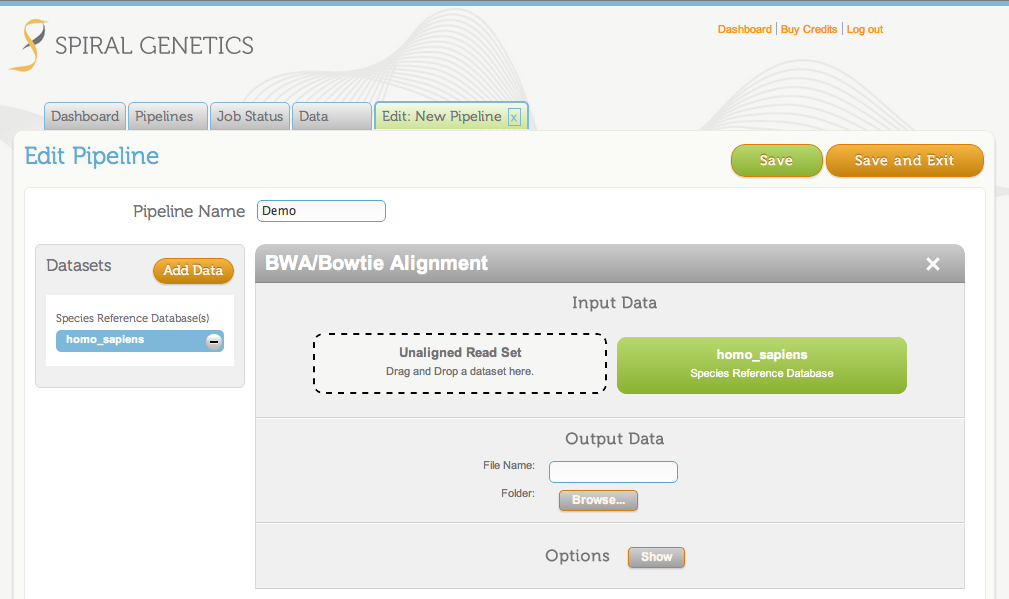DNA analysis allows scientists to dig deep into one’s genetic makeup, discovering if an individual is predisposed to a certain disorder or disease. While advances around DNA analysis have allowed scientists to more quickly analyze one’s DNA, a Seattle startup by the name of Spiral Genetics believes it can do it even faster and cheaper
Scientists come to Spiral with their sequenced DNA — DNA that has had it’s innards analyzed and broken down into “consumable” data — and utilize their software to help pinpoint different strands that might be correlated to cancer, autism or other diseases. Spiral also provides a platform for teams of scientists to access that data and work together on projects.
With six employees from a variety of disciplines, Spiral Genetics now offer support for seven different species (Humans, Mice, Rats, Yeast, Maize Fruit Flies, and Roundworms). But their Angellist profile reports an upcoming update that will support “virtually any species in the world.”
We caught up with CEO and co-founder Adina Mangubat — who has a background in distributed computing and a degree from The University of Washington in Psychology — for this edition of Startup Spotlight:
Explain what you do so our parents can understand it: “Spiral Genetics makes high-performance software for analyzing DNA. We use cloud computing to enable better diagnosis and treatment of diseases like cancer or autism, and the development of smarter drugs.”
Inspiration hit us when: “It was in one of our lowest moments. All of the co-founders — Becky Drees (CSO), Jeremy Bruestle (CTO) and I — were on a conference call with our advisor, Christophe Basciglia (co-founder of Cloudera), talking about mothballing the company. We were considering this because the technology that we had been working on, a cancer sequencing algorithm, was too early for the market. It hit us at that moment. Becky and I had been looking at the data for the cost of DNA sequencing, which was dropping at a stagering pace. Jeremy Bruestle had been looking at the existing bioinformatics software and was horrified by how hacked together it was. Together, we realized that the next generation of sequencing machines were going to outstrip the rate at which the software could process it. The only way to handle the impending tsunami wave of sequence data was to use distributed computing. We rewrote the business plan and started raising our seed round immediately.”
VC, Angel or Bootstrap: “We’ve taken some initial angel money to develop the technology, and secure early customers. With the market developing quickly, we need to expand the company to establish ourselves as the market leader and are in discussions with a number of funding sources.”

Our ‘secret sauce’ is: “There are three key ingredients in our secret sauce: speed, scale and accuracy.
Speed: The process of analyzing genomic data is computation heavy. We’ve developed a custom map-reduce-like framework that is optimized for cloud computing. This allows us to analyze DNA faster than any other company in the world. We can analyze a whole human genome’s worth of raw data in 3 hours (40x faster than our closest competitor).
Scale: The same computing technology that enables speed, also enables scale. Scale is extremely important because scale enables the discovery of genetic variations that have more subtle effects. Often, a disease is not caused by one genetic mutation, but rather by several smaller mutations that combine to make a huge difference.
Accuracy: Most of the algorithms being used to analyze DNA have limited capabilities in detecting indels. (Indels is short for insertions or deletions and refers to instances where a piece of DNA has been inserted or deleted from a genome). Most algorithms can only detect small very indels. We have a new genetic variation detection algorithm that can identify huge insertions and deletions. The detection of these variations is critical to understanding diseases where large insertions and deletions play a big role, as is the case with Autism.”
The smartest move we’ve made so far: “Forming a team with a very diverse range of backgrounds. All of the co-founders have expertise in completely separate areas, and it is the combination of all of this expertise that allowed us to see the problem of the computational bottleneck early, and to build a solution ahead of the market.”
The biggest mistake we’ve made so far: “We didn’t take company culture seriously in the beginning. We made some early hires based on skills and credentials without taking cultural fit into account. That was a big mistake. Culture is extremely important for attracting talent and keeping it. You can have the best product, market opportunity, etc. in the world, but if you don’t love the people you are working with, you won’t be able to make it through the tough moments. Fortunately, it was a mistake we learned early on.”

Would you rather have Gates, Jobs, Zuckerberg or Bezos in your corner: “Bezos. Not only do we use Amazon’s cloud heavily for our computing, but Bezos has show he can consistently execute across a wide range of hard problems, from retail to cloud computing. Amazon wins because of a very solid technological foundation and we believe this is our winning strategy as well.”
Our world domination strategy starts when: “Spiral’s software powers the genomic revolution. Everyone will have their genome sequenced–this data will be part of their medical record and drugs will be developed for specific populations making them safer and more effective than anything else on the market.”
Rivals should fear us because: “This is a complex problem. We saw this coming three years ago and spent that time to optimize our product to handle the most challenging datasets. We have developed the disruptive technology that will power the genomics revolution.”
We are truly unique because: “Our team has one of the most diverse backgrounds I’ve ever seen. You often hear the story about college roommates who were computer science majors starting a company together. This is not the case at Spiral. We have a huge range of backgrounds–psychology, molecular biology, ultrasound image analysis, media, security, lasers, entrepreneurship, japanese tea ceremony, you name it. In each field, each person is brilliant and has pushed the envelope of technology. At the beginning, the diversity of our team allowed us to have our first lightbulb moment. Today, it allows us to continue to innovate and create the best possible product.”
The biggest hurdle we’ve overcome is: “We bet the company on the assumption that in two to three years there would be sequencers that could generate a whole human genome in a day for $1000. We made that bet when the cost of sequencing was $100,000 and it took two weeks to make the data. People thought we were crazy. Making that bet and sticking with it, even when everyone was telling us that we were nuts was probably the biggest hurdle. It required us to trust our gut and push forward in a world of ‘no’. Overcoming that hurdle allowed us to be in the position we are in today. We are the only company that is prepared for the tsunami wave of data coming off of sequencers later this summer.”
What’s the one piece of advice you’d give to other entrepreneurs just starting out: “Trust your gut and love your team. Startups require hard work, dedication, resilience, and good people. If you don’t love the people you are working with, you’ll never make it through the rough patches.”





